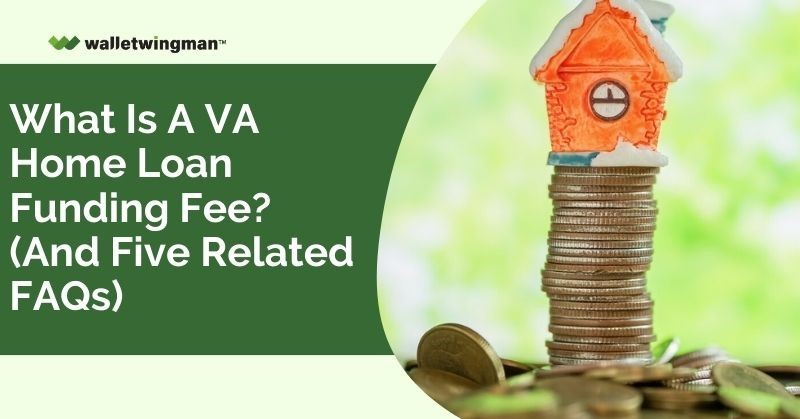This article is part of a series that covers various aspects of the VA loan process. In earlier articles, we explored everything from the minimum requirements to the home-buying process. In this article, we will focus on the VA funding fee by addressing some commonly asked questions, including VA funding fee exemption criteria.
The VA home loan program stands out as a popular mortgage option among military members and veterans across the United States, and it’s easy to see why. This unique program allows eligible borrowers to buy a home with zero money down and no mortgage insurance.
VA loans come with certain fees and expenses. Borrowers using this program have to pay closing costs, just like any other mortgage program. However, a distinct feature of the VA program is the introduction of a “funding fee,” setting it apart from other mortgage options. It’s important to note that certain individuals qualifying for waived VA funding fee get the benefit of no upfront payment obligations.
This article provides direct answers to some of the most common questions on this subject.
What is a VA loan funding fee, exactly?

The VA home loan funding fee is a one-time cost you might need to pay during the acquisition of a VA loan. This fee helps to fund the program, which in turn provides major benefits to military members and veterans in the form of flexible mortgage financing.
While the majority of VA loan users have to pay the funding fee, certain exceptions exist who enjoy the benefits of waived VA funding fee, and this will be addressed in a subsequent FAQ.
This is how the Department of Veterans Affairs describes it:
“The VA funding fee is a one-time payment that the Veteran, service member, or survivor pays on a … home loan. This fee helps to lower the cost of the loan for U.S. taxpayers since the VA home loan program doesn’t require down payments or monthly mortgage insurance.”
Who is required to pay the VA funding fee?
Most military members and veterans who use the VA loan program have to pay the funding fee. However, some exceptions are there, like disabled veterans and certain surviving spouses, whose VA funding fee waived.

The U.S. Department of Veterans Affairs outlines five specific scenarios in which a borrower might have waived VA funding fee on a home loan. You might be eligible for exemption if any of the following conditions apply to you:
- You’re currently receiving compensation through the VA for a service-connected disability.
- You’re eligible for VA compensation due to a service-connected disability, but you’re presently receiving retirement or active-duty pay instead.
- You’re the surviving spouse of a veteran and are currently receiving Dependency and Indemnity Compensation (DIC).
- You receive a proposed or memorandum rating before the loan closing date indicating eligibility for compensation due to a pre-discharge claim.
- You’re an active-duty service member and can provide evidence of having received the Purple Heart before or on the closing date.
It’s important to note that you don’t have to meet all these conditions. Meeting just one of them could be sufficient to be eligible for a VA loan funding fee exemption.
How much does it cost, and how is it calculated?
The VA funding fee is commonly represented as a percentage of the total loan amount. If you are required to pay it, the specific amount will depend on (A) your down payment and (B) whether you’ve used the program before.
For first-time homebuyers using the VA loan program with a down payment below 5%, the funding fee is usually set at 2.15%. If you’re a newcomer to the program but make a down payment of 5% or more, your funding fee drops to 1.5%. Opting for a down payment of 10% or more will further reduce the fee to 1.25%.

If you’ve previously used the program for a home purchase and are using it again with a down payment below 5%, the funding fee could go up to 3.3%.
Note: The figures mentioned above were accurate as of fall 2023. The Department of Veterans Affairs periodically adjusts this program, so for the latest information. Please refer to the official VA.gov website.
Are disabled veterans exempt from paying it?
Absolutely! There is no VA funding fee for disabled veterans with documented service-related disability is a significant benefit. This supports their financial well-being and enhances the affordability of homebuying when combined with a zero-down payment option.
What is the purpose of the VA funding fee?
The funding fee is essential for the continuity of the VA loan program, facilitating other veterans in their homebuying journey. It’s a way to share the expenses of the program, ensuring its ongoing support for those who have served.
The Department of Veterans Affairs provides mortgage lenders with a partial guarantee. Mitigating some of their losses in case of a borrower default. This, in turn, allows lenders to offer more flexible terms to borrowers, including the zero down payment for VA loan. The VA funding fee is a key component that facilitates and sustains this system.
Can it be rolled into the loan amount?

In a standard VA loan application, the borrower can either include the funding fee in the loan amount (and pay it off over time) or pay it upfront. It’s important to remember that opting to “roll it into” the loan will result in an increase in the size of your monthly payments.
The advantage is that spreading the fee over time makes it more manageable. Sparing you from the burden of paying thousands of dollars extra upfront.
Do National Guard and Reserve members have to pay it?
Indeed, in most cases, National Guard and Reserve members are required to pay the funding fee.
The program eligibility requirements are different for National Guard, Reserve, and active-duty military members. However, when it comes to the VA loan funding fee, there is no distinction (except for the five exemptions mentioned earlier, signifying waived funding fee eligibility).
A Summary of Key Points
Let’s distill the essential points from this article:
- The VA home loan program provides benefits, like no down payment and no mortgage insurance.
- Borrowers using VA loans may have to pay a unique “VA loan funding fee.”
- Exemptions include compensation for service-connected disabilities, surviving spouses receiving DIC, pre-discharge claims, and active-duty Purple Heart recipients. Resulting in the waived funding fee for VA loan. This exemption eliminates the upfront cost and allows eligible individuals to benefit from no down payment and no funding fee.
- The VA determines the funding fee as a percentage of the total loan amount. Depending on variables like down payment and prior utilization of the program.
- Most borrowers who make a down payment below 5% have a funding fee of 2.15%
- The funding fee helps sustain the VA loan program, enabling lenders to offer flexible terms like zero down payments.
- National Guard and Reserve members typically pay the same funding fee as regular veterans and active-duty military.


